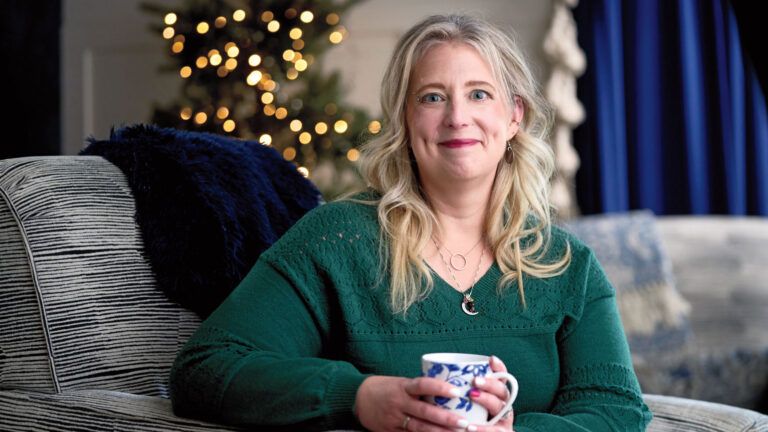Why is it so difficult to make friends these days? Busy lives, digital distractions, lingering pandemic isolation—so much gets in the way of lasting friendship. Yet friends matter more than ever. Last year, the U.S. Surgeon General Vivek Murthy issued an advisory about America’s epidemic of loneliness. Calling isolation a “profound threat to our health and well-being,” he urged Americans to reconnect with loved ones.
Jesus called his disciples friends. “The greatest love you can show is to give your life for your friends,” he said. Perhaps the book of Proverbs says it best: “A friend loves at all times.”
Amy Weatherly and Jess Johnston know what it takes to make friends against the odds. The two writers met online and bonded over shared interests (including a passion for queso), forging a friendship that has survived hectic schedules, two long-distance moves and a global pandemic.
In their new book, Here for It, Amy and Jess share their wisdom about making, keeping and deepening friendships. They draw on their own relationship and the experiences of 1.3 million followers in their popular Facebook community, “Sister, I Am With You,” a forum for all things friendship.
Guideposts asked Amy and Jess to recommend four ways our readers can overcome problems and strengthen friendships in their own lives. Here’s what they told us:
1. Be flexible, forgiving…and honest.
Jess: Not everyone has the same capacity for friendship. And people’s capacity changes throughout life. Kids make friends easily because they have tons of free time. Grown-ups busy with work, kids and errands? Not so much.
Forgive friends when life gets in the way. Be honest when your capacity gets squeezed. But also look for friends who share your emotional needs and abilities. If you’re a mom with small kids, it’s a good bet another mom will not only get you intuitively but have the same friendship expectations—and amount to give—as you.
Amy: Jess and I met in an online writing group. We had a lot in common in ways that made it obvious our capacity for friendship was the same. We both had small kids. We’d both just moved. We both needed to build our confidence as writers.
Most important, we’re both women of faith. And we’re open about that and pretty much everything else. There’s a lot of fake on the internet. That’s not us.
The first time we met in person, Jess ordered a big hamburger and fries and made no apologies about enjoying it. Sometimes women make a show of nibbling on a salad. Not Jess—or me. I love burgers too.
Somehow we got to talking about queso, the Tex-Mex melted cheese dip.
“You like queso?” I said.
“Love it,” said Jess.
“With American cheese?”
“Of course!”
Maybe being grounded in God let us not obsess over appearing perfect. We quickly shared details about our lives.
And that helped us know that we had the same capacity for friendship. We still do!
2. Be a good listener.
Jess: Do you feel nervous meeting new people? Ever wonder what to say to strangers?
Try listening. When you let someone else take the lead in a conversation, a burden lifts. Remember that the person you’re talking to was created by God and is loved by God. What a privilege to talk to someone like that and learn about their life!
When in doubt, ask questions. Expressing interest in the everyday details of another person’s life goes a long way. People love to be heard. Your interest signals that you believe someone matters.
Remember when Amy and I first met in person? During that dinner, Amy asked our waitress how she was doing and complimented her work. By the end of the meal, we were all talking and laughing. I was amazed at how Amy’s genuine interest in someone she’d just met turned a stranger into a friend.
Amy: Talking to someone new, I look for things in common. Not so I can jump in and share about myself, but so I can ask better questions. Let’s say I learn someone’s a teacher. I have kids in school. I’ll share a small detail about one of my kids’ classes, then say, “How are things in your class?”
Asking questions works especially well with a quieter person. If you’re one of those quiet people yourself, listening first gives you more material to respond to.
I want to go back to what Jess said about our waitress. I asked her questions, but I also paid her compliments. Jess did the same thing for me in our writing group. One of the first things she said was, “I really like the way you write.” That felt so good!
Nobody objects to a compliment. Everyone loves to be heard. Start with those two things, and you can’t go wrong.
3. Hang in there when things get hard.
Jess: A good friend says: “I’m here for you when you fall apart.” A really good friend means it.
When people fall apart, they say things they regret. They’re full of drama, and they focus way too much on themselves. A good friend is there for it all. Because remember: One day you’ll fall apart too.
When my kids were little—that all-consuming toddler phase when parents feel especially alone—a line in a sermon one Sunday gave me an idea. “If something in your life is lacking,” the pastor said, “plant seeds of generosity in that area.”
I was falling apart as a parent and way too busy. Who had time to be generous? I decided to try anyway.
My husband and I started inviting other young couples over for dinner. Our house got crazy with all those kids, but everyone had fun. And guess what? Those other parents were all falling apart and feeling lonely too!
A seed of generosity to people who need one can blossom into friendships that bless you too.
Amy: I’m the kind of person who makes friends easily but finds friendships hard to keep. I thought there was something wrong with me. Did I skip some essential life class on friendship?
Gradually, I realized that no one is born great at friendship. Each friendship is its own life class. You have to figure it out and do the work. Which means hanging in there when people fall apart or have less to give or seem less invested. Maybe what you interpret as lack of interest is just awkwardness—or lack of time.
Remember that God is your first and best friend. God loves you and never gives up on you. And let’s face it. None of us is as good a friend to God as he is to us. He loves us anyway.
With God as your foundation, you can handle it when friends fall apart. Or when they are too busy or drift away. Remain open. Stay generous. Be forgiving. Pray.
4. Remember that everyone sees things differently.
Jess: No one sees 20/20 when it comes to friendship. We all have our own quirks, tastes and stories. We all have our own brokenness. We have wounds that no one can see (maybe not even ourselves), and we take them into every relationship.
Amy and I met right before the pandemic. During the first months of our friendship, we were excited to meet a fellow writer. Everything seemed to be moving in the right direction.
Then, in early 2020, the world changed. There we were, both of us recent arrivals in the places we lived, trapped with small kids in the house, wondering if things would ever go back to normal.
The only way for our friendship to survive was to remember that, though our lives are similar, we are different people with different backgrounds who react to stress in different ways.
We fell back on the friendship skills we’ve already discussed. Lots of questions: “What’s happening where you are?” “How are you handling it?” “How much venting can you tolerate?”
Patient listening. Lower expectations during a crisis. Total honesty. No pretending we had things figured out. Our friendship survived intact, maybe even stronger.
Amy: The biblical word for what we’re talking about is grace. And maybe grace is the ultimate foundation of all successful friendships.
Grace is the foundation of God’s relationship with us. When it comes to God, I’m pretty sure any of us is a terrible friend. We ignore him much of the time. We disregard his good advice. We prioritize ourselves and give God the emotional leftovers.
God not only never gives up on us but also does everything in his power to rescue us from our worst selves. He puts up with our faithlessness and patiently brings out our best.
The key to finding and making friends turns out to be pretty simple. God shows us the way.
Listen. Ask questions. Express interest in everyone. Compliment people’s achievements. Be patient and understanding. Don’t walk away when things get hard. Be honest about your own struggles, and don’t pretend you’re perfect. Offer grace.
We hope that you find and sustain those treasured friendships that are one of God’s greatest gifts.





